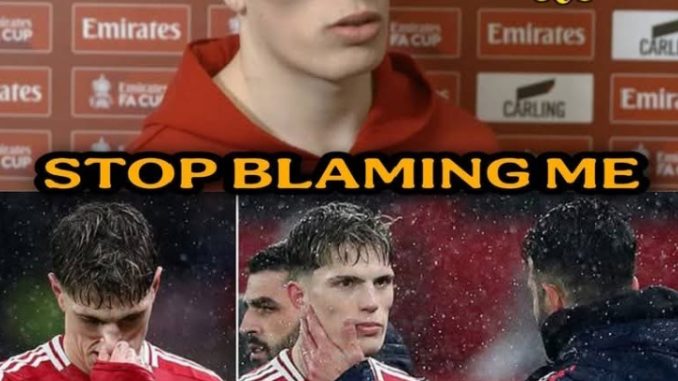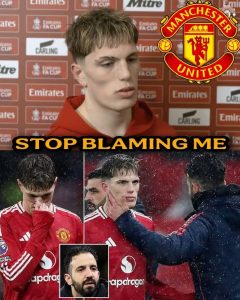
IF THIS IS TRUE THEN AMORIM NEEDS TO DO BETTER
In a stunning development that has sent shockwaves through the Manchester United fanbase, young winger Alejandro Garnacho has come forward to reveal a tense confrontation with manager Ruben Amorim following United’s disappointing performance in their most recent match. Garnacho, known for his fiery passion and direct style of play, has always been a player who gives his all on the field, but the comments he reportedly received from Amorim after the final whistle have left him upset and questioning the manager’s approach.
According to Garnacho, what Amorim said to him after the match crossed a line that the young player is unwilling to accept from any manager, regardless of their experience or status. Garnacho made it clear that while he is always ready to accept criticism and learn from his mistakes, he feels that Amorim’s comments were not only uncalled for but also unfair in the context of the team’s overall predicament. Garnacho went on to stress that he does not believe he is the root cause of Manchester United’s struggles this season, a statement that only adds to the tension surrounding the club.
If Garnacho’s account is true, then it’s clear that Ruben Amorim, despite being praised for his tactical ideas and leadership in some quarters, needs to reflect on how he communicates with his players, particularly those who are still finding their feet at a massive club like Manchester United. For Garnacho, a promising young talent who has shown moments of brilliance in the past, the comments made by his manager could have a lasting impact on his development and confidence. Moreover, this situation brings into sharp focus the broader issues at Manchester United under Amorim’s leadership.
The Discontent Between Garnacho and Amorim
Garnacho’s decision to go public with his frustration suggests that the words exchanged between him and Ruben Amorim after the match were particularly severe. The winger has made it clear that he gave his best during the game, as he always does, and that he felt he deserved at least a level of recognition or praise for his efforts. However, Garnacho was evidently taken aback by the comments made by Amorim, which seemingly placed blame on him in some way for the team’s poor performance.
While Garnacho has not gone into explicit detail about what was said during the post-match confrontation, it’s clear from his statements that he felt unfairly singled out. It’s not uncommon for managers to offer criticism after a poor result, but the manner and tone in which it’s delivered can have a significant impact on players, especially young ones like Garnacho who are still adjusting to the pressures of playing for a club as massive as Manchester United.
The fact that Garnacho felt the need to speak out suggests that the comments may have been particularly harsh or damaging. As a player who is still finding his feet at the highest level, Garnacho is likely in a delicate stage of his development. The weight of playing for a club like United, with its rich history and massive expectations, can be overwhelming at times, and a negative encounter with the manager could potentially affect his morale.
Garnacho’s Perspective: Not the Cause of United’s Predicament
One of the key points that Garnacho emphasized in his comments was that he does not believe he is the cause of Manchester United’s current predicament. This is a significant statement, as it suggests that Garnacho feels that the issues plaguing the team are far more complex than a single player’s performance.
Indeed, the struggles of Manchester United this season are a result of many factors. From tactical inconsistencies and injury issues to the lack of a clear identity and leadership in the squad, United’s problems cannot be pinned on one individual. While it’s true that certain players have underperformed at times, Garnacho is correct in asserting that the team’s issues are a collective problem, not one that can be solely attributed to him or any other single player.
The young winger’s frustration is understandable. Despite some inconsistent performances, he has shown flashes of brilliance, with his pace, directness, and creativity causing problems for opposition defenses. Garnacho’s potential is undeniable, and he has the ability to be one of United’s future stars. However, the collective struggles of the team have led to a general sense of frustration among the squad, and Garnacho’s experience is likely a reflection of the internal issues facing the club as a whole.
What’s more concerning, however, is the potential negative impact this situation could have on Garnacho’s development. Young players need to be nurtured, supported, and guided through their early years in senior football. If the comments from Amorim were as harsh as Garnacho suggests, it could erode the confidence of a promising young talent at a crucial stage of his career. For a player like Garnacho, who thrives on confidence and self-belief, a public dressing down could have a long-term effect on his mindset.
The Responsibility of a Manager: Effective Communication
As a manager, Ruben Amorim is responsible for not only the tactical direction of the team but also the mental and emotional well-being of his players. The way in which a manager communicates with their squad, especially when it comes to criticism, can have a significant impact on the players’ development and morale. A manager must be able to strike the right balance between being firm and being supportive, ensuring that players understand where they need to improve without feeling demoralized or scapegoated.
If Garnacho’s account is accurate, then it’s clear that Amorim needs to reassess his approach to communication. Public criticism or harsh words, especially directed at young players, can do more harm than good. Constructive criticism is a crucial part of player development, but it needs to be delivered in a way that encourages growth, not diminishes confidence.
Garnacho is not the only player who has been subjected to intense pressure at Manchester United in recent seasons. Many players have struggled under the weight of the club’s expectations, and there has been a growing sense of frustration within the squad. Amorim must ensure that he is providing the right environment for his players to thrive, where they feel supported, encouraged, and given the tools they need to succeed.
The Broader Context: United’s Struggles and Amorim’s Leadership
Garnacho’s comments also shed light on the broader issues at Manchester United under Ruben Amorim. The club has been struggling for consistency ever since the departure of Ole Gunnar Solskjaer, and Amorim’s tenure has been no exception. While the manager has introduced some positive tactical ideas and tried to implement a more structured system, United’s performance on the pitch has been far from convincing.
The problems at United go beyond individual players; they are symptomatic of deeper systemic issues within the club. Amorim has inherited a squad that is a mix of aging stars and young talents, with varying levels of experience and quality. The team has lacked cohesion and identity for years, and this has been reflected in their inconsistent performances. Garnacho, while an exciting prospect, is not the cause of these issues. The larger problems lie within the club’s structure and leadership, which need to be addressed if United is to return to the top.
Amorim himself, despite being a promising young manager with a strong tactical background, has been unable to fully unlock the potential of the squad. His frustration with individual performances is understandable, but the responsibility for the team’s struggles cannot fall solely on the shoulders of a few players, particularly not a young one like Garnacho.
Conclusion: Amorim Needs to Do Better
If Garnacho’s account is accurate, then Ruben Amorim must do better in his approach to managing and communicating with his players. As a young manager, Amorim has shown potential, but incidents like this highlight the importance of emotional intelligence and effective communication within the role. If the manager’s comments have had a negative impact on Garnacho’s confidence, this could prove detrimental not only to the player’s development but also to United’s overall team morale.
Manchester United is in a delicate moment in its history, and the last thing the club needs is further internal discord. Amorim needs to ensure that his leadership style fosters an environment of trust, support, and constructive feedback. As for Garnacho, he must continue to focus on his development, but the club and its management must ensure that he is nurtured properly and given the confidence to reach his potential.
In the end, football is a team sport, and the struggles of Manchester United cannot be attributed to any one player. If the club is to succeed, it will require a collective effort from everyone involved—players, management, and fans alike. For Amorim, this situation is a wake-up call, and how he handles it mov
ing forward will define his legacy at the club.

Leave a Reply